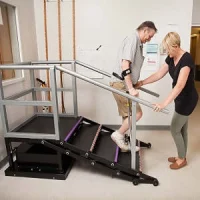According to new research from the University of York, smaller and more localised cardiac rehabilitation (CR) centres are as effective as larger ones. The study is funded by the British Heart Foundation (BHF) and is published in Open Heart.
This is the first study of its kind and was conducted by researchers in the Cardiovascular Health Research Group in the University's Department of Health Sciences. They compared outcomes by evaluating factors such as smoking rates, cholesterol levels and physical activity. The findings show that smaller and localised CR centres were able to deliver similar patient outcomes as compared to larger, centralised centres and that improvements were observed in patients irrespective of the size of the centre.
Cardiac rehabilitation can improve patient mortality rates and reduce their chances of another heart event. Despite these benefits, less than half of eligible heart patients attend these centres after a major heart event.
See also: 'Life's Simple 7' Programme Reduces Risk of Heart Failure
One of the primary reasons for the low numbers is accessibility. Availability of localised services could help improve these rates and benefit patients as well.
More emphasis has been placed on merging small CR centres and convert them into centralised schemes. The goal is to reduce costs and at the same time, it is perceived that larger centres would result in better outcomes. However, these findings indicate that this is not the case.
Study author Professor Patrick Doherty, from the Department of Health Sciences at York, said: “This study is important as it is based on routinely collected data, within the NHS, which means this is a real world effect that directly relates to patient care. One of the arguments for merging cardiac rehabilitation services was improved outcomes, but our study shows that the same outcomes are achieved at smaller, more localised rehabilitation centres.”
See also: Cardiac Patients Receive Comparable Outpatient Care
Dr Mike Knapton, Associate Medical Director at the BHF points out the need to make CR schemes more accessible so that more patients could benefit from them. He highlights that these findings show that localised services can improve access without diminishing patient outcomes.
Source: University of York
Image Credit: Flickr










